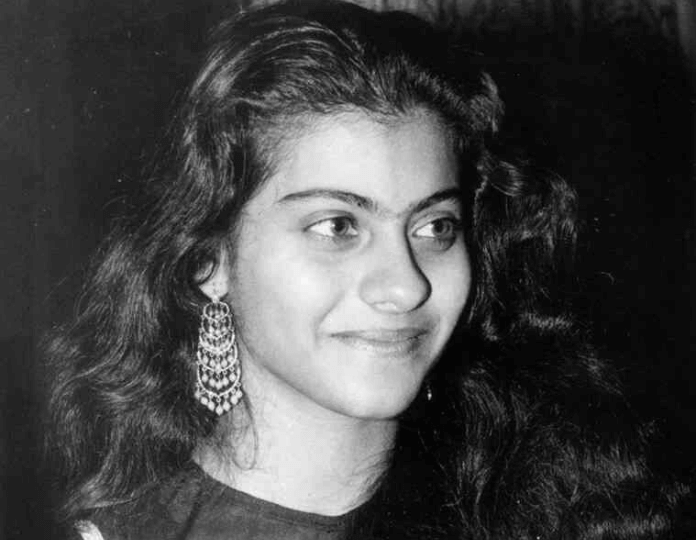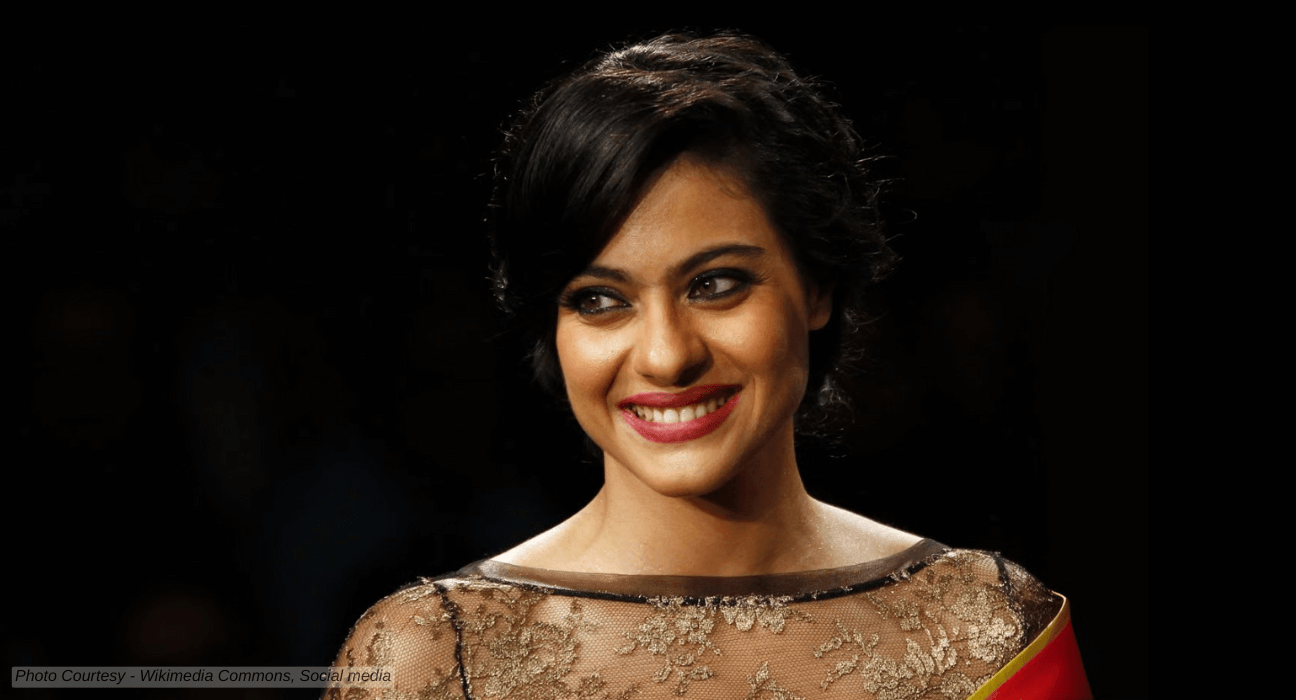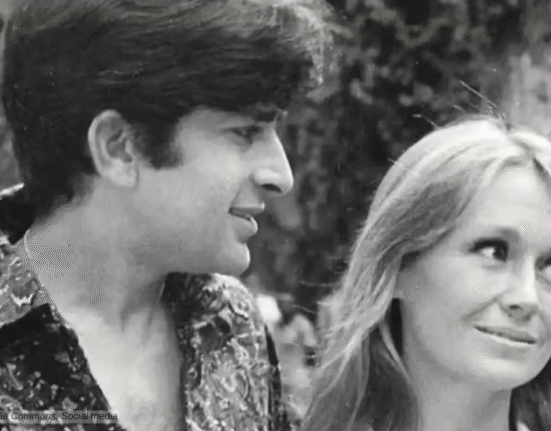One of the most capable and beloved actresses of her time, Kajol is celebrated for her versatility and expressive performances. As one of the most successful actresses with six Filmfare Awards, her iconic roles in Dilwale Dulhania Le Jayenge (1995) and Kuch Kuch Hota Hai (1998) defined 1990s Hindi cinema.
I still remember famous film critic Vipin Handa calling her “a warm sunshine in a chilling cold (Yakh sardiyon me gunguni si dhoop). I rarely listen to what critics say, but it was one thing I believed wholeheartedly and still do. But she was unconventional to the core. She was not fair; she never had sharp features, she had a unibrow, and everything was wrong with her according to the rulebook of Hindi cinema. She defied every norm, she broke every rule, and she proved herself as one of cinema history’s most iconic performers.
Early Life and Career
Kajol was born in Mumbai, Maharashtra, India, on August 5, 1974, to a film-centric family of Bengali-Marathi descent. Her mother, Tanuja, was a prominent actress, while her father, Shomu Mukherjee, was a film producer and director. Her younger sister, Tanishaa Mukerji, is also an actress. Kajol’s maternal aunt, Nutan, and grandmother, Shobhna Samarth, were iconic actresses, while cousins Rani Mukerji, Sharbani Mukerji, and Mohnish Bahl are also actors. Her parents separated when she was young.
Kajol attended St. Joseph’s Convent School in Panchgani, Maharashtra, a boarding school. She left school at 16 to pursue acting, prioritizing her career over formal education. Although she never attended college, her exposure to literature and dance during school influenced her performances. She is fluent in Hindi, English, and Marathi and understands Bengali, reflecting her multicultural upbringing.
Kajol Screen
Kajol made her debut with Bekhudi (1992) opposite Kamal Sadanah, directed by Rahul Rawail, while still in school. She played Radhika, with her mother, Tanuja, as her on-screen mother. The film flopped commercially, but her performance gained notice.

She quit school to focus on acting, landing her breakthrough role in Baazigar (1993) opposite Shah Rukh Khan. The film stars Kajol as Priya Chopra opposite Shah Rukh Khan’s vengeful anti-hero. Her naive yet spirited performance complements the film’s dark tone. Critics praised her natural charm, marking her as a rising star. The crime thriller’s success established her as a promising talent. Her chemistry with Khan led to multiple collaborations, cementing her rise in the industry.
She followed it with K.V. Raju’s Udhaar Ki Zindagi (1994) with Jeetendra and Maushmi Chaterjee, Yash Chopra’s Yeh Dillagi (1994), with Saif and Akshay Kumar. She also paired with Shahrukh Khan in Rakesh Roshan’s blockbuster Karan Arjun (1995).
Kajol Became Simran
Dilwale Dulhania Le Jayenge (1995), directed by Aditya Chopra, is a romantic drama that features Kajol as Simran, an NRI caught between love and family duty. Paired with Shah Rukh Khan, her vibrant portrayal won her the Filmfare Best Actress Award. The film ran for over 1000 weeks at Mumbai’s Maratha Mandir, becoming a cultural milestone. Critics lauded her expressive acting, with India Today noting her “effortless charisma.”
One of her standout performances came in Gupt: The Hidden Truth (1997), directed by Rajiv Rai. The mystery thriller casts Kajol as a psychopathic killer. Her anti-hero role, a rarity for actresses then, showcased her versatility. The film earned her the Filmfare Best Performance in a Negative Role Award, the first for a female actor.
In 1998 came Karan Johar’s directorial debut, Kuch Kuch Hota Hai (1998). The romantic comedy stars Kajol as Anjali, a tomboy in love with her best friend Rahul (Shah Rukh Khan). To make matters complicated, Rahul was in love with Tina. Her dynamic performance won her a second Filmfare Best Actress Award.
In 1998 she starred in Tanuja Chandra’s psychological thriller “Dushman.” In the film she had a double role as twin sisters, one of them a victim of rape murder, and the other investigating and avenging the crime. Her performance was universally lauded for its courage and emotional availability.
The Magician
Directed by Karan Johar, Kabhi Khushi Kabhie Gham (2001) features Kajol as Anjali Sharma, a spirited Punjabi woman. She learned Punjabi diction with help from Yash Johar, earning praise for her comic-dramatic timing. She won her third Filmfare Best Actress Award.


Some of her other notable films include Ishq (1997), Minsara Kanavu (Tamil, 1997), Pyaar Kiya To Darna Kya (1998), Pyaar To Hona Hi Tha (1998), Dil Kya Kare (1999), Hum Aapke Dil Mein Rehte Hain (1999), Raju Chacha (1999), and many more.
Kajol’s acting style is marked by spontaneity and emotional authenticity. She brings a unique energy with her expressive eyes and natural delivery. Karan Johar described her as an “atom bomb” on set, keeping crews on their toes. She prepares minimally, relying on instinct, as seen in Gupt’s challenging negative role, which she found tough but mastered. Her ability to adapt to diverse genres—romance, thriller, and drama—sets her apart.
Craft and Personal Life
After Kabhi Khushi Kabhie Gham, Kajol took a sabbatical to focus on family, returning with Fanaa (2006), a romantic thriller directed by Kunal Kohli. She played Zooni, a blind Kashmiri woman, opposite Aamir Khan, earning her fourth Filmfare Best Actress Award. She then appeared in Ajay Devgan-directed U Me Aur Hum (2008) and Siddharth P. Malhotra’s We Are Family (2010).
In My Name Is Khan (2010), directed by Karan Johar, she portrayed Mandira, an Indian-American Hindu woman struggling with her husband’s autism, her child’s death, and growing Islamophobia after 9/11 in the USA. She won her fifth Filmfare Best Actress Award for her performance.
Dilwale (2015), a Rohit Shetty action romance with Shah Rukh Khan, saw her as Meera, a mafia don’s daughter. Despite mixed reviews, it was a commercial success. She also starred in Pradeep Sarkar’s Helicopter Eela (2018), based on Anand Gandhi’s Gujarati play Beta, Kaagdo. In Tanhaji (2020), she played Savitribai Malusare opposite Devgn.

Later Work

In 2021, she starred in Renuka Shahane’s trilingual family drama film “Tribhanga,” also starring Tanvi Azmi and Mithila Palkar. The film tells the story of a dysfunctional family of three women and their unconventional life choices, partly based on Shahane’s own relationship with her mother. The film gets rave reviews from critics.
Kajol starred in Revathi-directed Salaam Venky (2022), a film based on The Last Hurrah by Shrikant Murthy. The film tells the story of a young boy (Vishal Jethwa) with Duchenne muscular dystrophy. It depicts a mother’s support for her son Venky’s fight for his right to euthanasia and organ donation. The film garnered immense critical acclaim for touching on a sensitive and crucial issue
Her streaming roles include Lust Stories 2 (2023) as Devyani, The Trial (2023) as Noyonika, and Do Patti (2024) as Saumya/Saanvi, showcasing her versatility in digital platforms. More recently she was seen in the horror film Maa (2025) and the action drama Sarzameen (2025).
Personal Life and Legacy
In his career of over 3 decades, Kajol has won seven Filmfare Awards from 13 nominations. These include five Best Actress awards (Dilwale Dulhania Le Jayenge, Kuch Kuch Hota Hai, Kabhi Khushi Kabhie Gham, Fanaa, and My Name Is Khan) and one Best Negative Role for Gupt. She also got the Padam Shri from the Government of India for contributions to cinema. With Shah Rukh Khan, Kajol became the first Indian actor invited to the US stock exchange.
Kajol married actor Ajay Devgn on February 24, 1999, in a traditional Maharashtrian ceremony at his Juhu home. They met on the set of Gundaraj (1995), initially clashing but falling in love during filming. The wedding drew media scrutiny for occurring at her career’s peak, but Kajol continued acting selectively.
They have two children: daughter Nysa, born April 20, 2003, and son Yug, born September 13, 2010. She describes motherhood as “fab,” saying her kids bring out her best.

Kajol’s expressive acting, versatility, and defiance of Hindi film beauty norms have made her an icon. Her roles in Dilwale Dulhania Le Jayenge and Kuch Kuch Hota Hai remain cultural benchmarks. Unlike many contemporaries, she sustained a successful career post-marriage and motherhood, earning the title “archetypal New Age woman.”
Kajol on IMDB













Leave feedback about this